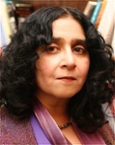Dr. Tilottama Rajan
Romantic literature, post-Kantian philosophy and contemporary theory
Dr. Tilottama Rajan is a Distinguished University Professor and former Canada Research Chair (2002-21) cross-appointed between English and the Theory Centre. She had been a former Director of the Centre twice (1995-2001 and 2011-2015). Dr. Tilottama Rajan started her career as a scholar of British Romantic literature focalised through German Romantic aesthetic theory (Schiller, Schopenhaier, Nietzsche, Romantic hermeneutics), a field that wasn’t quite defined at her time. Her continued work on Romantic literature has led to several productions including three books and three co-edited essay collections.
Dr. Rajan’s interests in German Idealist and Romantic philosophy are interdisciplinary, with an emphasis on the relations among the life sciences, aesthetics and philosophy, and a wider interest in systems and organizations of knowledge. As a development of these interests, she is currently working on the late 18th century British medical and bio/physiological theorist John Hunter and related figures, seen through the lens of German Naturphilosophie, and also approached in terms of the disciplines it generated and the immunitary paradigms used to discipline it in the course of the 19th century.

Dr. Rajan helped build the Centre when it started in 1990. The interdisciplinary mandate of the Centre has promoted more of her interest in the “meta” problems of (inter)disciplinarity and the organization of knowledge. Despite seeing both personal and institutional challenges to her role in the academic environment, being appointed at the Centre has been seminal for Dr. Rajan, she says. In her personal life, she loves squirrels and beautiful things, including handicrafts, jewelry, and rugs, which she would pick up while travelling.
To students considering interdisciplinary work, Dr. Rajan stresses, “there is no point in doing the work unless you are passionate about it and want to do it for intellectual reasons.” She thinks that the PhD study should be taken as an opportunity (rather than a privilege) to work on one’s interest and train oneself to be a thinking person; it should be completed in a finite period though. She observes “you have to make a place for yourself by being very proactive in terms of publishing; editing a collection, which puts you in connection with other, more established scholars.” One piece of advice to anyone who pursues the academic path and does get a position, she adds, is to work their way to a position in which they can come closer to doing what they want. Moreover, the scholarly world is becoming much more open to the path of being an independent scholar, which opens more possibilities for students planning their post-graduate life.



